United Nations  Most of us have heard about the United Nation's peacekeeping and Most of us have heard about the United Nation's peacekeeping and 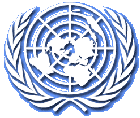 humanitarian assistance. But the many other ways the UN affects all our lives are not always so well known. humanitarian assistance. But the many other ways the UN affects all our lives are not always so well known.
The United Nations is central to global efforts to solve problems, which challenge humanity. Co-operating in this effort are more than 30 affiliated organisations, generally with "United Nations" in their title. Day in and day out, the UN and its family of organisations work to promote respect for human rights, protect the environment, fight disease, foster development and reduce poverty. 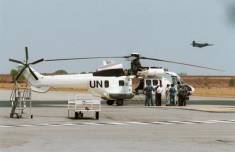 The United Nations also leads the international campaigns against drug trafficking and terrorism. Throughout the world, the UN and its agencies assist refugees and set up programmes to clear landmines, help improve the quality of drinking water and expand food production, make loans to developing countries and help stabilise financial markets. The United Nations also leads the international campaigns against drug trafficking and terrorism. Throughout the world, the UN and its agencies assist refugees and set up programmes to clear landmines, help improve the quality of drinking water and expand food production, make loans to developing countries and help stabilise financial markets.
How The UN Works 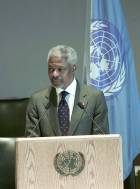 51 countries established the United Nations on 24 October 1945. Today, nearly every nation in the world belongs to the UN: membership now totals 189 countries. 51 countries established the United Nations on 24 October 1945. Today, nearly every nation in the world belongs to the UN: membership now totals 189 countries.
When States become Members of the United Nations, they agree to accept the obligations of the UN Charter, an international treaty, which sets out basic principles of international relations. According to the Charter, the UN has four purposes: - Maintain international peace and security,
- Develop friendly relations among nations,
- Co-operate in solving international problems and in promoting respect for human rights,
- Be a centre for harmonising the actions of nations.
 UN Members are sovereign countries. The United Nations is not a world government, and it does not make laws. It does, however, provide the means to help resolve international conflict and formulate policies on matters affecting all of us. At the UN, all the Member States - large and small, rich and poor, with differing political views and social systems - have a voice and vote in this process. UN Members are sovereign countries. The United Nations is not a world government, and it does not make laws. It does, however, provide the means to help resolve international conflict and formulate policies on matters affecting all of us. At the UN, all the Member States - large and small, rich and poor, with differing political views and social systems - have a voice and vote in this process.
The United Nations has six parts to it. Five of them - the General Assembly, the Security Council, the Economic and Social Council, the Trusteeship Council and the Secretariat - are based at UN Headquarters in New York. The sixth, the International Court of Justice, is located at The Hague, the Netherlands. Further details about these can be found from the links below. The General Assembly 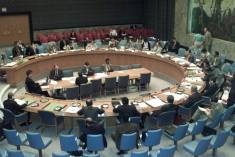 All UN Member States are represented in the General Assembly - a kind of parliament of nations which meets to consider the world's most pressing problems. Each Member State has one vote and decisions on important matters are decided by two-thirds majority, whilst other matters are decided by simple majority. In recent years, a special effort has been made to reach decisions through consensus, rather than by taking a formal vote. All UN Member States are represented in the General Assembly - a kind of parliament of nations which meets to consider the world's most pressing problems. Each Member State has one vote and decisions on important matters are decided by two-thirds majority, whilst other matters are decided by simple majority. In recent years, a special effort has been made to reach decisions through consensus, rather than by taking a formal vote.
The Security Council 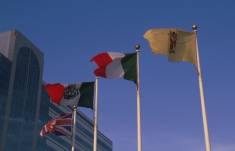 The UN Charter gives the Security Council main responsibility for maintaining international peace and security. The Council may convene at any time, day or night, whenever peace is threatened. Under the Charter, all Member States are obligated to carry out the Council's decisions. There are 15 Council members. Five of these - China, France, the Russian Federation, the United Kingdom and the United States - are permanent members. The other 10 are elected by the General Assembly for two-year terms. The UN Charter gives the Security Council main responsibility for maintaining international peace and security. The Council may convene at any time, day or night, whenever peace is threatened. Under the Charter, all Member States are obligated to carry out the Council's decisions. There are 15 Council members. Five of these - China, France, the Russian Federation, the United Kingdom and the United States - are permanent members. The other 10 are elected by the General Assembly for two-year terms.
What the UN Does For Peace  Preserving world peace is a central purpose of the United Nations. Under the Charter, Member States agree to settle disputes by peaceful means and refrain from threatening or using force against other States. Over the years, the UN has played a major role in helping defuse international crises, resolving protracted conflicts and has worked to prevent conflicts from breaking out. In post-conflict situations, it has increasingly undertaken co-ordinated action to address the root causes of war and lay the foundation for peace in the future. Preserving world peace is a central purpose of the United Nations. Under the Charter, Member States agree to settle disputes by peaceful means and refrain from threatening or using force against other States. Over the years, the UN has played a major role in helping defuse international crises, resolving protracted conflicts and has worked to prevent conflicts from breaking out. In post-conflict situations, it has increasingly undertaken co-ordinated action to address the root causes of war and lay the foundation for peace in the future.
So let's hope they continue to succeed! Links http://www.un.org/ http://www.unesco.org/
- The Pupiline Team
|
|

 Most of us have heard about the United Nation's peacekeeping and
Most of us have heard about the United Nation's peacekeeping and  humanitarian assistance. But the many other ways the UN affects all our lives are not always so well known.
humanitarian assistance. But the many other ways the UN affects all our lives are not always so well known.  The United Nations also leads the international campaigns against drug trafficking and terrorism. Throughout the world, the UN and its agencies assist refugees and set up programmes to clear landmines, help improve the quality of drinking water and expand food production, make loans to developing countries and help stabilise financial markets.
The United Nations also leads the international campaigns against drug trafficking and terrorism. Throughout the world, the UN and its agencies assist refugees and set up programmes to clear landmines, help improve the quality of drinking water and expand food production, make loans to developing countries and help stabilise financial markets. 51 countries established the United Nations on 24 October 1945. Today, nearly every nation in the world belongs to the UN: membership now totals 189 countries.
51 countries established the United Nations on 24 October 1945. Today, nearly every nation in the world belongs to the UN: membership now totals 189 countries. UN Members are sovereign countries. The United Nations is not a world government, and it does not make laws. It does, however, provide the means to help resolve international conflict and formulate policies on matters affecting all of us. At the UN, all the Member States - large and small, rich and poor, with differing political views and social systems - have a voice and vote in this process.
UN Members are sovereign countries. The United Nations is not a world government, and it does not make laws. It does, however, provide the means to help resolve international conflict and formulate policies on matters affecting all of us. At the UN, all the Member States - large and small, rich and poor, with differing political views and social systems - have a voice and vote in this process. All UN Member States are represented in the General Assembly - a kind of parliament of nations which meets to consider the world's most pressing problems. Each Member State has one vote and decisions on important matters are decided by two-thirds majority, whilst other matters are decided by simple majority. In recent years, a special effort has been made to reach decisions through consensus, rather than by taking a formal vote.
All UN Member States are represented in the General Assembly - a kind of parliament of nations which meets to consider the world's most pressing problems. Each Member State has one vote and decisions on important matters are decided by two-thirds majority, whilst other matters are decided by simple majority. In recent years, a special effort has been made to reach decisions through consensus, rather than by taking a formal vote. The UN Charter gives the Security Council main responsibility for maintaining international peace and security. The Council may convene at any time, day or night, whenever peace is threatened. Under the Charter, all Member States are obligated to carry out the Council's decisions. There are 15 Council members. Five of these - China, France, the Russian Federation, the United Kingdom and the United States - are permanent members. The other 10 are elected by the General Assembly for two-year terms.
The UN Charter gives the Security Council main responsibility for maintaining international peace and security. The Council may convene at any time, day or night, whenever peace is threatened. Under the Charter, all Member States are obligated to carry out the Council's decisions. There are 15 Council members. Five of these - China, France, the Russian Federation, the United Kingdom and the United States - are permanent members. The other 10 are elected by the General Assembly for two-year terms.  Preserving world peace is a central purpose of the United Nations. Under the Charter, Member States agree to settle disputes by peaceful means and refrain from threatening or using force against other States. Over the years, the UN has played a major role in helping defuse international crises, resolving protracted conflicts and has worked to prevent conflicts from breaking out. In post-conflict situations, it has increasingly undertaken co-ordinated action to address the root causes of war and lay the foundation for peace in the future.
Preserving world peace is a central purpose of the United Nations. Under the Charter, Member States agree to settle disputes by peaceful means and refrain from threatening or using force against other States. Over the years, the UN has played a major role in helping defuse international crises, resolving protracted conflicts and has worked to prevent conflicts from breaking out. In post-conflict situations, it has increasingly undertaken co-ordinated action to address the root causes of war and lay the foundation for peace in the future.